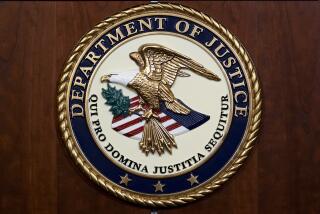U.S. Pressures China on N. Korean Arms Traffic
The U.S. ambassador to the United Nations prodded a reluctant China on Sunday to aggressively implement U.N. sanctions on North Korea, declaring that Beijing had a “heavy responsibility” to influence its longtime ally.
Speaking one day after the U.N. Security Council imposed sanctions, John R. Bolton told ABC’s “This Week” that it would be “powerfully persuasive in Pyongyang,” the North Korean capital, if the regime’s leading supplier of energy and food took tough action to halt weapons traffic into and out of the North.
“China has got a heavy responsibility here,” said Bolton, adding that North Korea’s announced nuclear test Oct. 9 “had to have been humiliating to China,” which has urged patient diplomacy to halt Pyongyang’s nuclear program.
The Security Council voted unanimously Saturday for a resolution authorizing countries to search cargo going into and out of North Korea for items used to manufacture nuclear, biological or chemical weapons and some conventional weapons, including ballistic missiles, tanks and combat aircraft. In addition, the resolution mandates that countries freeze any financial assets used to support programs to manufacture such weapons and bans the importation of luxury goods.
But the difficulty of ensuring that sanctions have some bite was underscored when the South Korean government indicated today it would probably still pursue two joint economic projects with North Korea that have provided Pyongyang with about $1 billion in hard currency. The manufacturing plants in the Kaesong industrial complex and tour operations to North Korea’s Mt. Kumgang resort represent cornerstones of South Korea’s policy of engagement.
U.S. diplomats are beginning to work out the rules for enforcing the ban in Asia and elsewhere. But China’s declaration that it would not take part in searches is one of several loopholes that have arisen.
“We’ll see what actually comes out of Beijing,” Bolton told ABC. He insisted, however, that because China voted for the resolution, “it has an obligation to make sure that it complies.”
A statement issued Sunday by China offered no new insight into how hard Beijing might push its difficult neighbor, and voiced its continued preference for negotiation.
“We maintain that the action by the Security Council should clearly state the firm stance of the international community, and should create conditions conducive to the peaceful resolution of this issue through dialogue and negotiations,” said Chinese Foreign Ministry spokesman Liu Jianchao in a statement released on the ministry’s website late Sunday.
U.S. Secretary of State Condoleezza Rice, who is visiting East Asia this week, took a conciliatory tone. “I’m quite certain that China is going to live up to its responsibilities,” she said on “Fox News Sunday.”
She declined to discuss the details of searching North Korean vessels, saying that those issues needed to be worked out. The new measure authorizes countries to board ships that enter their waters or ports, she said, but she noted on CBS’ “Face the Nation” that it was a “powerful tool ... that needs to be used carefully” to avoid any risk of conflict.
“None of us want to enhance conflict with these measures,” she told CBS.
Chinese officials have expressed concern that the sanctions risk a dangerous military confrontation.
Asked on “Fox News Sunday” whether the U.S. intended to form a separate “coalition of the willing” to impose additional sanctions on Pyongyang, Rice said U.S. officials were “very satisfied with this resolution.” Still, she added, “we believe that there may be other steps that will be necessary, given North Korea’s behavior.”
Some administration allies, however, were signaling concern about China’s attitude toward the U.N. measure.
Sen. John W. Warner (R-Va.), chairman of the Senate Armed Services Committee, said on “Face the Nation” that if China’s 880-mile border with North Korea “is left open, then all the rest of the containment and security measures could easily fail.... A chain is no stronger than its weakest link.”
In the aftermath of the U.N. vote, Australia and Japan promised to enforce the sanctions and possibly to take tougher bilateral action.
The resolution raised questions about how the United Nations Security Council would deal this week with another divisive issue: the possibility of sanctions against Iran for its refusal to halt some aspects of its nuclear program.
Some analysts are suggesting that the hesitation of China and Russia to move strongly against North Korea may signal that they will resist even modest sanctions on Iran.
-
Times staff writers Mark Magnier in Beijing and Bruce Wallace in Tokyo contributed to this report.
More to Read
Sign up for Essential California
The most important California stories and recommendations in your inbox every morning.
You may occasionally receive promotional content from the Los Angeles Times.









